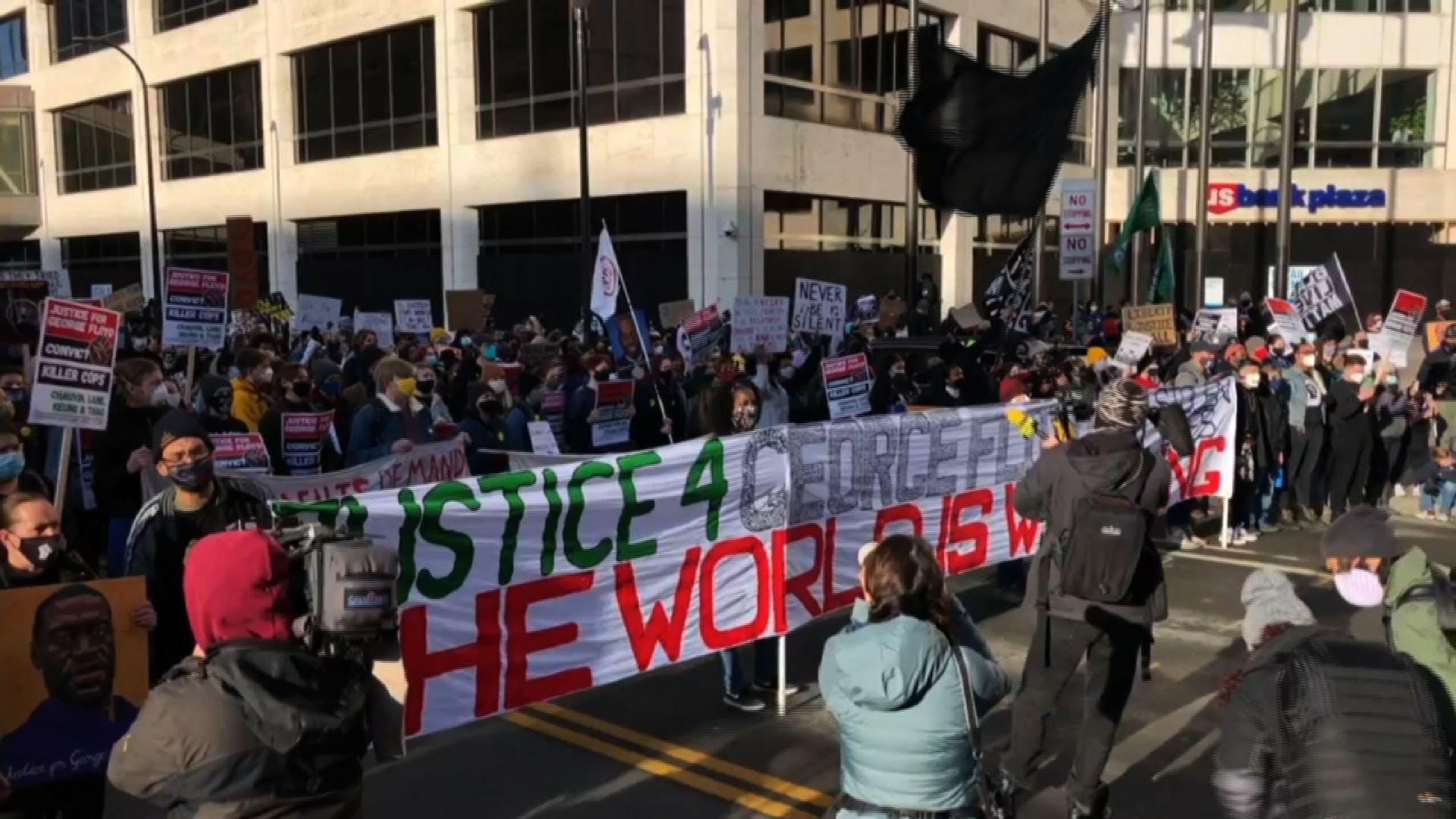Minneapolis under stress: Residents awaits start of Derek Chauvin murder trial as appeals ruling disrupts schedule
Tami Abdollah , N'dea Yancey-Bragg | USA TODAY

Jury selection in the murder trial of former Minneapolis cop Derek Chauvin was supposed to begin Monday as artists and activists gathered outside the barricaded Hennepin County courthouse to call for justice in the death of another Black man at the hands of police.
Instead, the day began with a confusing debate over whether it was premature to select jurors without resolving the question of whether Chauvin will face an additional charge of third-degree murder.
The defense said it planned to ask the state Supreme Court by Tuesday afternoon to review whether Chauvin, accused of killing Floyd by pressing his knee on Floyd's neck for more than 9 minutes, could face that charge. Chauvin already faces charges of second-degree murder and manslaughter.
Prosecutors with the Minnesota Attorney General's office scrambled to ask the Minnesota Court of Appeals to halt jury selection while that appeal is underway.
By lunch, potential jurors had been sent home for the day. After a series of brief hearings Monday afternoon, attorneys struck 16 jurors for cause based solely on their responses to a questionnaire. The day ended without a single juror stepping foot into the courtroom.
With no word Monday afternoon from the appeals court, Hennepin County District Court Judge Peter Cahill said jury selection would begin Tuesday.
“Unless the Court of Appeals tells me otherwise, we’re going to keep going,” Cahill said.
Appeals ruling on additional murder charge disrupts plans
The case against Chauvin has become a jigsaw puzzle, its prospects complicated by a separate appeals court ruling made in February.
The ruling by the Minnesota Court of Appeals upheld the third-degree murder conviction of ex-Minneapolis police officer Mohamed Noor, who fatally shot Justine Ruszczyk Damond in 2017. The appeals court upheld the conviction even though the incident didn't involve anyone other than the victim.
That contradicted a reading of the law Cahill relied on last fall to throw out a third-degree murder charge against Chauvin. After the ruling in the Noor case, prosecutors asked Cahill to reinstate that charge. He refused.
Friday, the appeals court said Cahill should not have tossed that charge because the Noor ruling was the precedent.
The Noor case, meanwhile, is set to be heard by the Minnesota Supreme Court in June.
"This is very rare and extremely unfortunate," said Mary Moriarty, the former Hennepin County chief public defender. "It's very rare for the parties and the judge frankly not to know the charges are when you are scheduled to start your trial, (but) everyone is doing the best they can."
Prosecutors 'want a clean trial'
The city of Minneapolis is in limbo after bracing for the stress of a trial that reopens wounds from last summer's protests over police brutality, and the violence that followed. Downtown businesses are boarded up. The courthouse has been surrounded by fencing and concrete barriers.
"They've spent a million dollars on barricades and National Guard troops, called all the jurors in, and they had to go through security for an hour. It's really embarrassing," said Ted Sampsell-Jones, a professor at Mitchell Hamline School of Law in neighboring St. Paul.
Despite Cahill's statement that he's going forward Tuesday, legal observers say they are prepared for a delay of days or even weeks, depending on how things shake out in the two cases.
"From the Attorney General's perspective, they don’t want to create any errors in the case," Moriarty said. "They want a clean trial so there aren’t legitimate issues on appeal."
The challenge for prosecutors, Moriarty said, is if they move ahead with the trial and Chauvin is convicted of third-degree murder but nothing else. That would raise the stakes of the Supreme Court's hearing on the Noor case.
If the Supreme Court were to throw out the Noor conviction, Chauvin could appeal his conviction on those grounds.
"I have no crystal ball about what they're going to do. I really do feel for people who have been so anxiety-ridden and traumatized," Moriarty said. Especially when it's so hard to understand the legal back-and-forth, "it’s just awful for the community."
Delays add to stress for Minneapolis residents
Outside the courthouse, a group of more than 100 protesters demonstrated in front of Hennepin County Government Center for several hours. Artists and activists drenched flowers and mirrors in what appeared to be fake blood. Relatives of Black people killed by police gave speeches full of emotion.
Donna Morris, who heads a anti-gun violence organization Mother’s Love, said delaying the inevitable – the trial – "only serves to keep the communities under stress."
"If the trial is delayed, it will only create more tension in a community which is already on edge," Morris said while taking photos outside the courthouse. "Not only are we dealing with the trial, we’re dealing with the effects of the trial," including worries about property being destroyed.

George Floyd's brother, Terrence Floyd, spoke at a news conference in New York Monday and said he hoped to be in Minnesota for hearings later this month.
"It’s kind of surreal right now that we have to basically relive this whole situation all over again," Floyd said. "I’m going to get through this. I’m going to help my family get through this (and) I’m hoping and praying for the outcome that we all want.
"But you know in reality," he said, "I’m going to say, if it don’t go that way, I just know and believe in my heart that there’s going to be change, regardless, for us as a nation."
Follow USA TODAY National Correspondent Tami Abdollah, who is covering the Derek Chauvin trial, at https://twitter.com/latams
Via PakapNews